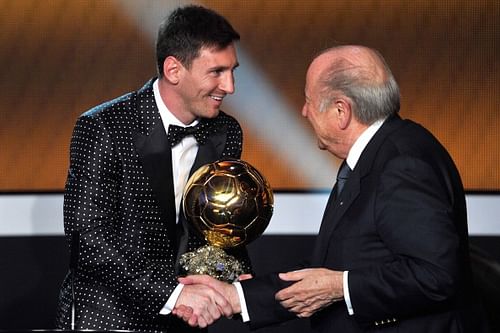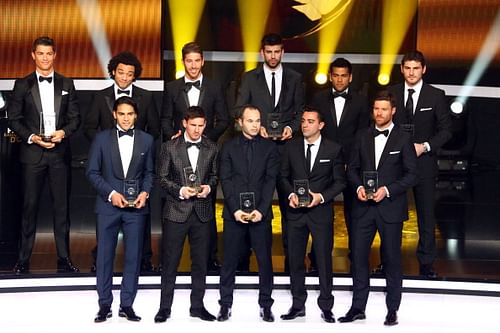
FIFA Ballon d'Or- A Publicity Stunt?
Football’s annual red carpet night, the FIFA Ballon d’Or ceremony, has been concluded and yet again it has ended in controversy. Winning a Ballon d’Or is the ultimate individual recognition any footballer can get, while being named as a member of the FIFA World Team of the Year is a close second. But this year, the credibility of these awards and the basis of selection has again come into question.

The Ballon d’Or was established in 1956 by a French magazine France Football. This award, previously called the European Player of the Year award, was merged with the FIFA World Player of the Year award in 2010. Originally, this award was used as a method to spread knowledge about football in other countries and increase the popularity of the beautiful game. But now it is used more as a vehicle to promote FIFA than anything else.
This year, Lionel Messi won for the fourth time in a row and for the second time this has caused much debate among the football pundits as to what criteria is being used to decide the winner. The ongoing debate, whether it is the personal performance or the importance of the player in his team’s success that is being considered, has reared its head and sadly we are, yet again, no closer to an answer.
Last year, Lionel Messi won the award despite being outscored by Cristiano Ronaldo. With the trophies that Messi won and the pivotal role he played in this success, Ronaldo never really had much of a chance. But this year, while Messi had a tremendous campaign on a personal level by scoring 92 goals in the calendar year, the club has had a forgettable year whereas Ronaldo, while outscored by Messi, won the league and almost singlehandedly dragged Portugal to the Euro semi finals. Wasn’t he more important and central to the team’s success? What of Iniesta? While his club season was disappointing, he played an important role in Spain’s success in the European championships and was even named the Player of the Tournament. The same argument can be made for Wesley Sneijder who was not even named in the final three couple of years ago despite playing an inspirational role for Inter Milan in their treble winning season and for the Dutch national team in reaching the finals of the World Cup. So what are the criteria employed by FIFA in selecting the best player in the world?
With this debate raging, FIFA World 11 has further tarnished the reputation and credibility of the organization and the award. Like in the case of the Ballon d’Or, this selection has also baffled the world. Naming all players from La Liga, with ten of them (except Falcao) from Real Madrid and Barcelona. While some names like Iniesta, Messi and Ronaldo cannot be questioned, others are open to debate.

The selection of Dani Alves ahead of Lukasz Piszczck (Dortmund) or Stephan Lichtsteiner (Juventus), who both had a wonderful season for the club winning the domestic league, raises the question if the players are chosen more for their reputation than their performance. The inclusion of Gerard Pique is yet another surprise as he featured in only a few matches due to his famous falling-out with Guardiola. With European success with Spain and Copa del Rey in his favour, does it really exceed the contributions of Mats Hummels (Dortmund) or Andrea Barzagli (Juventus) for their respective clubs, with the latter having had an unbeaten season, and good campaigns with Germany and Italy respectively? While there cannot be much complaints about the frontline, a case can be made for Didier Drogba who was massive for Chelsea in their journey to winning the double, being a talisman and scoring important goals along the way.
The biggest surprise of all was the exclusion of Andrea Pirlo. Considered surplus to requirement by Milan, he was inspirational for Juventus as they went on to win the domestic league undefeated and equally, if not more, impressive for Italy in the European championships, being voted Man of the Match in three matches along the way to the finals.
Such things are debatable but considering the amount of players chosen from the two La Liga sides, it calls into question whether there is a bias towards the two big clubs in Spain due to their financial muscle, elite status and immense fan base. While all these things are all questionable, the real blame lies with the organization for the lack of rules in the selection procedure, which fails to specify if it is the personal performance or the influence of a player on his team’s success or otherwise, and a voting system that allows to choose favourites rather than the deserving.
While passionate football fans know the truth, it sends a wrong signal to other people that Spain is where the heart of football lies and calls into question the credibility of the awards. Were these players really the best in the world in the last year or is this all just a cleverly disguised publicity stunt by FIFA to draw the attention of the people and increase the followers of the beautiful game?